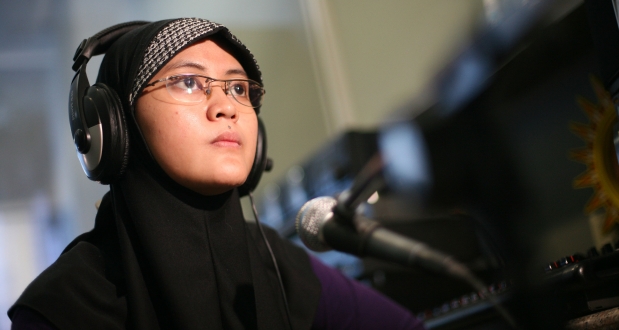- About
- Topics
- Picks
- Audio
- Story
- In-Depth
- Opinion
- News
- Donate
- Signup for our newsletterOur Editors' Best Picks.Send
Read, Debate: Engage.
| February 28, 2019 | |
|---|---|
| topic: | Women's rights |
| tags: | #women's rights, #India, #Khasi |
| partner: | NewsDeeply |
| located: | India |
Emarine has been the subject of an intense harassment campaign on social media over the past few months. The 28-year-old Acumen Fellow – a participant in a leadership program that aims to cultivate social changemakers – was threatened with rape and acts of violence after she started an online campaign against the Khasi Hills Autonomous District Council (KHADC)’s lineage bills, which seek to change the near-unique customs of the Khasi tribe.
Based in the northeastern Indian state of Meghalaya, the Khasi tribe is one of the world’s few matrilineal societies, in which a family’s youngest daughter inherits her mother’s wealth and property, and children take their name and lineage from their mother’s side of the family.
The Khasi Social Custom of Lineage Second Amendment Bill, which was passed unanimously by the KHADC on July 25, states: “Any Khasi woman who marries a non-Khasi, as well as her offspring born out of such marriages, shall be deemed as non-Khasi who shall lose the Khasi status and all privileges and benefits as a member of the Khasi tribe.” However, the bill has yet to be ratified.
Hasina Kharbhih, the founder of the Impulse NGO Network (INGON) tackling human trafficking, based in Shillong, Meghalaya’s capital, explains, “It is an attempt to snatch our freedom and throw us in an invisible cage where we would be haunted and harassed by Khasi men if they find us out and about with non-tribal men. How can anybody encroach upon our fundamental rights and dictate terms in choosing a life partner?”
In August, the KHADC decided to recall the bill, and a similar one from 2015, so that a KHADC executive committee could hold a special session to pass them. This has yet to happen, but – in the absence of any ruling – tensions have been running high in the community, and women activists who have vocally opposed the bill have been forced to file police complaints due to the threats they’ve received on social media.
“We have been protesting on social media because there is a fear of being attacked by those supporting the bill if we take to the streets,” says Agnes Kharshiing, president of the Civil Society Women’s Organization (CSWO). “The comments are inflammatory, filled with rape and death threats.”
The KHADC claims its only motivation is to stop the dilution of the Khasi tribe, even if it means a radical overhaul of their customs. “It is an attempt to save our culture because non-Khasi men are marrying Khasi women mainly to get benefits, such as avoiding tax, through their wives,” says Erwin K. Syiem Sutnga, legal adviser to the KHADC. “Our society is getting smaller day by day because of constant intrusion from outside.”
However, even pressure groups seeking to undermine the Khasi’s matrilineal traditions have expressed their unhappiness with the current bill.
“We have been fighting for men’s rights for a long time. Currently, it’s the women who have the responsibility to raise children and run the houses while the men have no such duty. As a result, most of them have become alcoholics and drug addicts,” says Keith Albion Pariat, former president and member of the Syngkhong Rympei Thymmai (SRT) group.
The SRT has been pushing for patrilineal rights for Khasi men since 1990. “We support the bill, but Khasi women should never lose their identity. We also strongly condemn the attacks on social media against women activists. They should stop,” Pariat says.
For INGON’s Kharbhih, bringing Khasi customs in line with the rest of India would be a disaster for the community: “Unlike other parts of the country, girls are welcomed in our society because the lineage of [their family] depends on them. Children born out of illicit relationships do not suffer as the child takes their mother’s surname, and it is her responsibility to raise them.”
As further evidence that the KHADC is trying to downgrade women’s status in Khasi society, Kharbhih cites the widely accepted Khasi custom known as Tang Jait: “The Tang Jait ceremony is done when a tribal man marries a non-tribal woman to incorporate her and her children into the matrilineal setup. Why do they allow such marriages if they are trying to stop us getting married to non-tribal men? It is a sheer attempt to curb our rights that will not be tolerated.”
It’s a sentiment the women activists share: For the time being, they are confident that they will be able to stop the passage of the bill with the support of a society that has placed women at the forefront of the community for centuries.
She also calls out the double standards of the KHADC, which seemingly has had no problem letting non-Khasi men into the community when there is money involved. “The KHADC – which is trying to change the setup in the name of saving our society from non-tribal [elements] – has been encouraging them by giving trade licenses for doing business. Such hypocrisy should immediately be put to rest.”
This article originally appeared on Women's Advancement Deeply. You can find the original here.
By copying the embed code below, you agree to adhere to our republishing guidelines.
